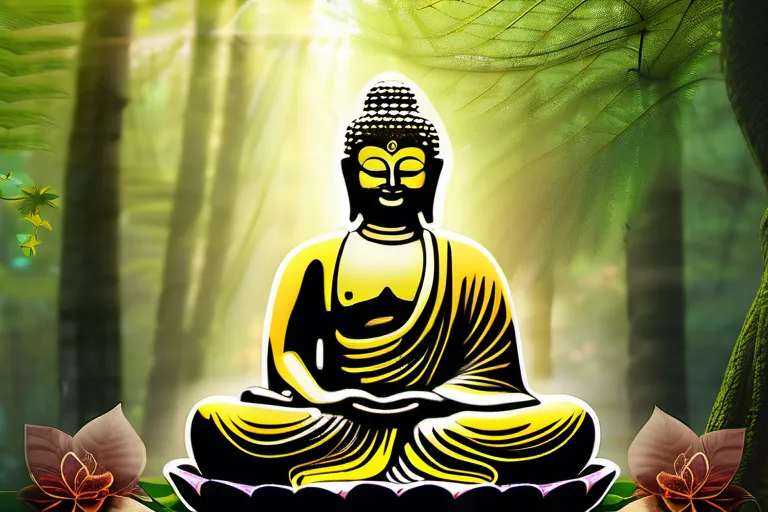Explore the philosophical and historical reasons behind Buddhism’s unique perspective on deity.
Buddhism, one of the world’s major religions, stands out for its lack of belief in a personal god. But why is this? This article delves into the intricacies of Buddhist philosophy and history to provide a detailed answer.
The Four Noble Truths: The Foundation of Buddhist Philosophy
Why don’t Buddhists believe in a god? To understand this, let’s delve into the Four Noble Truths—these are like the foundation stones that shape Buddhist philosophy and wisdom.
The First Noble Truth states that life is suffering. Imagine if you were to look at your own life, what would you see? A constant stream of challenges, disappointments, or just plain discomfort? Buddhism views these experiences as a natural part of existence, much like the changing seasons in nature. Is there really a god who creates all this suffering?
The Second Noble Truth delves into the cause of suffering: attachment and craving. Can you imagine trying to grasp onto something that is constantly flowing and changing? It’s like trying to catch mist—it just slips through your fingers. This attachment leads to desires, which in turn lead to more suffering. If gods were present, wouldn’t they have ended this cycle?
The Third Noble Truth offers a glimmer of hope: the end of suffering is possible. By letting go of attachments and desires, one can achieve a state of peace or Nirvana. It’s like finding a path through a dense forest; the more you follow it, the clearer your way becomes. How could this be achieved if there were a divine being who could simply wave a magic wand to end suffering?
The Fourth Noble Truth outlines the path that leads to the cessation of suffering—the Eightfold Path. This path includes right understanding, right intention, and so on, all leading towards enlightenment. It’s like a ladder; you climb each step with dedication and mindfulness. Can one truly believe in gods if they’re not actively involved in this journey?
So, when we ask why Buddhists don’t believe in a god, it’s because their philosophy revolves around understanding the nature of suffering and how to overcome it through personal effort and enlightenment. The idea of a personal god doesn’t fit into this framework—it might even be seen as an obstacle.
Anatta: The Concept of No Self in Buddhism
When we delve into the heart of Buddhism, one concept stands out as pivotal: Anatta, the teaching that challenges our very notion of selfhood. Have you ever stopped to ponder what ‘self’ really means? Is it a solid, unchanging entity or something more fluid and dynamic?
In traditional Western thought, the idea of a personal god often hinges on the belief in an eternal soul or self. However, Buddhism takes a different path with its concept of Anatta, which literally translates to ‘no-self.’ This is not about denying existence; rather, it’s about understanding that what we call our ‘self’ is actually a collection of constantly changing physical and mental phenomena.
Imagine your mind as a flowing river. The water appears constant, but every molecule moves through the flow in an instant. Just like this river, the self you perceive is not static—it’s a series of ever-changing experiences. This idea helps us understand that what we identify with isn’t a permanent entity but a complex process of interaction and change.
By embracing Anatta, Buddhists challenge the very notion of a personal god who exists outside this natural cycle of cause and effect. Instead, they focus on understanding and working with these impermanent phenomena to achieve enlightenment. This perspective helps us see that our lives are interconnected and interdependent, much like the river’s flow or the breeze through the leaves.
So, when you ask why Buddhists don’t believe in a personal god, remember that it’s not about denying a divine presence but recognizing the nature of reality as it truly is. In this view, any concept of an external deity becomes redundant because the essence of existence lies within these intricate patterns of cause and effect.
Anatta invites us to look beyond superficial identities and into the depths of our being, revealing that true wisdom comes from understanding the fluidity of life itself. This journey of self-discovery is a profound exploration, one that challenges us to see ourselves not as isolated beings but as parts of an interconnected whole.
The Role of Karma in Buddhist Beliefs
Buddhism, often seen as a path that eschews the belief in deities, offers a profound exploration into the nature of existence and causality through its concept of karma. This idea is more than just a set of moral guidelines; it’s a central pillar that influences every aspect of Buddhist philosophy. How does karma contribute to Buddhism’s unique perspective on divinity? Let’s dive deeper.
Imagine life as a vast garden, where each action is like planting a seed. Karma is the soil in which these seeds grow, and their outcomes are the flowers that bloom. Just as planting a daisy results in a daisy, actions lead to consequences—this principle forms the basis of karma. In this metaphor, if karma were a deity, it would not be a personal god but rather the natural order of cause and effect. However, Buddhism posits that understanding this natural order is enough for enlightenment.
Consider how this differs from many other religions where a personal god intervenes in human affairs. If you were to ask why Buddhists don’t believe in such a deity, karma provides an elegant answer: the belief in a higher power is replaced by the knowledge that one’s actions shape their destiny. This doesn’t mean there are no forces at play; rather, it means these forces are within oneself and can be understood and controlled.
Moreover, the concept of anatta, or no self, further reinforces this idea. Just as a daisy is not its seed but the result of countless seeds sown over time, individual identity in Buddhism is seen as impermanent and fluid, shaped by one’s actions rather than predestined by a divine will. This understanding leads to a sense of empowerment: you are not controlled by an external god but can shape your own path through mindful actions.
So, when we ask why Buddhists do not believe in a personal deity, the answer lies deeply within their belief system. Karma and the understanding of cause and effect offer a comprehensive explanation that aligns with both philosophical and ethical teachings. In this framework, every action has consequences, and it is through these actions that one can navigate life’s complexities without relying on external divine intervention.
Buddhism’s Historical Development: From Siddhartha Gautama to Present Day
Buddhism, like a river flowing through time, has transformed significantly since its birth over 2500 years ago. The journey began in northern India when Siddhartha Gautama, known to us as the Buddha, sought enlightenment and found it under the Bodhi tree. His experiences led him to question the very notion of a creator deity, which was prevalent in many of the religions he encountered.
Imagine, if you will, Siddhartha sitting beneath that tree, contemplating the nature of existence without any reference to gods or deities. He observed the world around him and realized that suffering was an inherent part of life—a conclusion that challenged the idea of a benevolent creator who could have prevented such pain.
From these early beginnings, Buddhism spread across Asia, adapting and evolving with each culture it touched. In Tibet, for example, Buddhist teachings merged with indigenous beliefs to create a unique form of practice focused on meditation and the attainment of Nirvana. Meanwhile, in Japan, Zen Buddhism developed, emphasizing direct insight and experience over ritualistic practices.
Today, Buddhism exists in countless forms, each with its own traditions and interpretations. Yet, despite these differences, one constant remains: the belief that personal enlightenment is possible through one’s own efforts rather than divine intervention. This perspective on the nature of existence and the path to liberation continues to influence millions worldwide.
So, as we journey through history, it becomes clear that Buddhism’s reluctance towards a traditional notion of deity stems not just from a lack of evidence but also from profound philosophical insights into the nature of reality and human potential. The question then arises: Can one truly achieve spiritual fulfillment without relying on a higher power?
Comparing Buddhist and Western Theistic Beliefs
Why do Buddhists look at deity through a different lens compared to many Western religions? To understand this, we must delve into the heart of Buddhist philosophy and compare it with theistic beliefs in Christianity, Hinduism, and others.
Imagine, if you will, a garden where every flower blooms differently. Each represents a unique path to understanding the divine or ultimate reality. For Buddhists, the idea of a personal god is akin to one particular type of flower that they choose not to cultivate in their garden.
In Buddhism, the concept of Dharmakaya (the body of truth) and Sambhogakaya (the enjoyment body) is often used to describe higher forms of existence or consciousness. However, these are not seen as personal gods but rather manifestations of enlightenment and wisdom.
- Buddhism’s approach: Buddhism posits that the path to enlightenment lies in understanding the Four Noble Truths and practicing the Eightfold Path. The focus is on one’s own liberation through insight and mindfulness, rather than relying on a personal god for salvation or guidance.
- Western religions’ view: In contrast, many Western religions emphasize the role of a personal god who intervenes in human affairs, provides moral guidance, and offers salvation. This concept is deeply rooted in narratives such as creation stories, miracles, and the afterlife.
By not believing in a personal god, Buddhists do not deny the existence of higher spiritual realms or ultimate reality; they simply approach it differently. They see the universe as a vast interconnected web where all phenomena arise naturally from causes and conditions, without the need for an external creator.
Isn’t it fascinating how different paths can lead to similar destinations? In Buddhism, the journey is seen as one of self-discovery and awakening, while in many Western religions, faith often requires belief in a specific deity who intervenes in human lives.
This difference in perspective does not mean that Buddhists are devoid of spirituality or believe in nothing. Instead, their spiritual practice revolves around meditation, ethics, and wisdom. They see the world as a place to practice compassion and understanding, without the need for a personal god.
The Impact of Buddhism on Modern Thought and Society
Have you ever pondered why Buddhism, despite its rich spiritual and philosophical traditions, doesn’t believe in a single, all-powerful deity? Could it be that this non-theistic perspective is more than just a historical anomaly but holds profound implications for modern thought and society?
Buddhism emerged as a response to the suffering and dissatisfaction prevalent in ancient Indian society. The early Buddhist teachings challenged the traditional Hindu concept of a supreme creator, questioning whether a deity could be responsible for the endless cycle of birth, death, and rebirth known as samsara. This doubt about the existence of a personal god was not merely a rejection but a quest for deeper understanding—why does suffering exist?
The influence of Buddhism extends far beyond its origins. It has shaped modern thought in various ways. For instance, the concept of anatta, or non-self, resonates with contemporary philosophical discussions on identity and individuality. This idea that nothing is permanent or fixed challenges our modern understanding of personal identity, leading to a more fluid and dynamic view of selfhood.
In terms of environmental ethics, Buddhist teachings emphasize the interconnectedness of all beings, which parallels modern sustainability efforts. The recognition that harming others ultimately harms oneself aligns with ecological principles advocating for responsible stewardship of the planet. This non-theistic perspective fosters a sense of responsibility towards nature and other living beings, promoting a harmonious coexistence.
Buddhism’s impact on society is also evident in its approach to conflict resolution and mental well-being. The emphasis on mindfulness and compassion has inspired numerous therapeutic practices, such as cognitive-behavioral therapy (CBT) and mindfulness-based stress reduction (MBSR). These modern techniques draw from the ancient Buddhist teachings of awareness and empathy, demonstrating how traditional wisdom can be integrated into contemporary life.
Conclusion
 By understanding the Four Noble Truths and the concept of Anatta, we can appreciate the unique perspective that Buddhism offers on the nature of reality and existence.
By understanding the Four Noble Truths and the concept of Anatta, we can appreciate the unique perspective that Buddhism offers on the nature of reality and existence.











